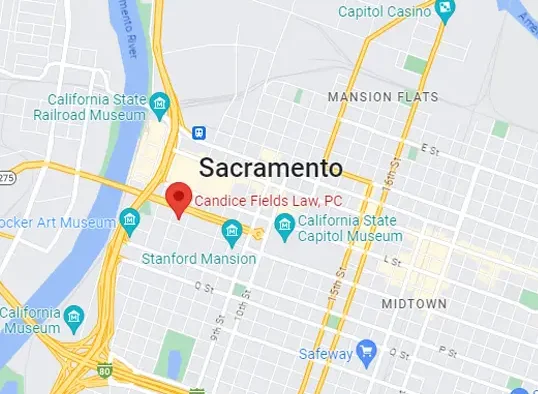Preindictment Federal Criminal Investigations
Navigate the Legal Labyrinth with Confidence
The period leading up to a formal indictment in a federal criminal case is crucial. During this preindictment stage, many of the critical elements of the prosecution's case are assembled, and the direction of the case is often determined. At Candice Fields Law, we specialize in preindictment federal criminal investigations, helping our clients navigate this challenging and critical phase of the legal process.
Need legal assistance?
What is a Preindictment Investigation?

A preindictment investigation is a stage in criminal justice where federal law enforcement agencies gather information about potential illegal activities before formally charging someone with a crime. The Federal Bureau of Investigation (FBI), Drug Enforcement Administration (DEA), Internal Revenue Service (IRS), or other federal agencies may be involved. This process often includes surveillance, interviews, grand jury testimony, and document subpoenas.
Why is Legal Representation Crucial at This Stage?
Preindictment investigations are crucial in shaping the course of your case. An investigation can be a stressful experience, but having an experienced federal criminal defense attorney by your side can make a significant difference. The right representation can protect your rights, ensure you are not being unjustly targeted, and even prevent charges from being filed altogether.
How Can Candice Fields Law Help You?
At Candice Fields Law, our approach is founded on strategic, aggressive representation from the earliest stages of your case. Our experienced team:
Understands Federal Procedures and Regulations
We have deep knowledge of the complex procedures and regulations involved in federal investigations. This allows us to create robust defense strategies and effectively contest any procedural errors or rights violations.
Develops Personalized Strategies
Every case is unique. We take the time to fully understand your situation, crafting a personalized legal strategy that aligns with your needs and objectives.
Leverages Preemptive Action
If we are involved early in the investigation, we can take preemptive action. This may include negotiating with federal agencies, ensuring your rights are protected during the investigation process, or presenting evidence that may deter formal charges.
Provides Consistent Support and Communication
We are committed to clear, timely communication. We keep you informed about the developments in your case, ensuring you understand your options and the potential implications at each step.
How Do You Know If You Are Being Investigated?
Knowing whether you are under investigation can often be challenging because the process is typically secretive in its initial stages. However, there are several potential signs that you may be the subject of an investigation:
Unusual or repeated contact by federal law enforcement officers
If federal agents like those from the FBI, DEA, IRS, etc., contact you, it may be because you are under investigation. They might ask you questions or seek to interview you.
Witnesses or acquaintances being interviewed
If people you know are contacted or interviewed by law enforcement officers, and they share this information with you, it could be a sign of an investigation.
You receive a subpoena
A subpoena could be for documents, records, or testimony related to a case. The receipt of a subpoena often indicates that you are involved in an investigation, though not always as a target.
Surveillance
If you notice unfamiliar vehicles or individuals repeatedly in your vicinity, it could be a sign of surveillance, which could indicate an investigation.
Search warrant execution
If law enforcement officers execute a search warrant at your home or office, it is a clear indication of an investigation.
You receive a "target letter" from federal prosecutors
This is a letter informing you that you are the target of a grand jury investigation. If you receive one, it is crucial to contact a defense attorney immediately.
If you experience any of these signs, it is crucial to consult with an experienced criminal defense attorney as soon as possible to protect your rights. A federal criminal defense attorney can help you navigate any interactions with law enforcement and potentially help minimize the potential consequences of an investigation.
What To Do If You Get Notice You Are Being Investigated
Finding out that you are under investigation can be an unsettling experience, but taking the right steps can help protect your rights and build a strong defense if charges are eventually filed. If you receive notice that you are being investigated, consider taking the following steps:
Do not panic
Although it is natural to feel stressed or worried, it is important to stay calm and make rational decisions.
Engage an attorney
The first thing you should do is contact a reputable criminal defense attorney, particularly one with experience in federal investigations if your case is at the federal level. They can provide guidance and handle any interactions with law enforcement on your behalf.
Avoid discussing your case
It is crucial not to discuss your case with anyone other than your attorney. This includes friends, family, and especially law enforcement. Anything you say can be used against you later.
Do not destroy evidence
Even if you think that some evidence could be incriminating, destroying it can lead to additional charges and generally looks suspicious. Your attorney can advise on how to handle such situations.
Exercise your right to remain silent
If law enforcement officials attempt to question you, politely but firmly decline to answer until your attorney is present.
Document everything
Keep track of any interactions you have with law enforcement, including dates, times, places, and what was discussed. This information may be helpful in your defense.
Follow your attorney's advice
Once you have an attorney, they will guide you through the investigation and any legal proceedings that may follow. It is crucial to follow their advice carefully.
Stages of Criminal Prosecutions
The legal process for criminal prosecutions can be a complex and lengthy, involving multiple stages and key differences depending on whether the case is handled at the state or federal level. Here is a basic outline of the stages involved and some of the differences between state and federal prosecutions:
Investigation
This is the initial stage where law enforcement agencies gather evidence about a crime. This could involve interviewing witnesses, gathering physical evidence, surveillance, etc.
Charging
Based on the evidence collected, law enforcement presents the case to a prosecutor (district attorney at the state level or U.S. Attorney at the federal level) who then decides whether to file charges and what those charges should be.
Initial Hearing/Arraignment
During this stage, the accused is formally read the charges against them, informed of their rights, and asked to enter a plea (guilty, not guilty, or no contest).
Discovery
This is the pre-trial stage where both the prosecution and defense share evidence and information. The defense will also usually file pre-trial motions during this phase, which could involve requests to suppress certain evidence, dismiss charges, etc.
Plea Bargaining
Many cases are resolved through plea bargaining, where the accused agrees to plead guilty to a lesser charge in exchange for a reduced sentence.
Trial
If no plea deal is reached, the case goes to trial. Both sides present their case, and a jury (or sometimes a judge in a bench trial) determines the guilt or innocence of the accused.
Sentencing
If the defendant is found guilty, the court will determine the appropriate punishment, which could involve fines, probation, or imprisonment.
Appeal
After a conviction, the defendant has the right to appeal the verdict or the sentence. An appellate court then reviews the case for any legal or procedural errors.
Candice Fields - A Veteran Federal Criminal Defense Attorney
Candice Fields is a seasoned federal criminal defense attorney, with over 20 years of experience representing clients in complex federal matters. She has a reputation for tenacity, strategic thinking, and a deep commitment to her clients, offering unparalleled expertise during preindictment investigations.
Your future and your freedom are too valuable to leave to chance. Trust the experienced team at Candice Fields Law to guide you through the complexities of preindictment federal criminal investigations.
Contact us today to schedule a consultation and learn more about how we can help you navigate the uncertain waters of federal criminal investigation.
FAQs
1. What is a preindictment federal criminal investigation?
A preindictment federal criminal investigation is the process by which federal law enforcement agencies gather information about a potential crime before formally charging someone. This may involve interviews, surveillance, grand jury testimony, or document subpoenas.
2. How do I know if I am under federal investigation?
There are several signs that you might be under investigation: unusual or repeated contact by federal law enforcement officers, acquaintances being interviewed, receipt of a subpoena, noticeable surveillance, search warrant execution at your home or office, or receiving a "target letter" from federal prosecutors.
3. What should I do if I am under investigation?
The first step is to remain calm. Then, engage a reputable criminal defense attorney, preferably with federal case experience. Avoid discussing your case with anyone but your lawyer, do not destroy any potential evidence, exercise your right to remain silent, and follow your attorney's advice closely.
4. Can charges be avoided during a preindictment investigation?
While it is not guaranteed, an experienced attorney may be able to prevent charges from being filed during the preindictment phase. They can negotiate with federal agencies, ensure your rights are upheld, and present evidence that may deter formal charges.
5. What is the difference between a state and federal investigation?
Federal investigations typically involve violations of U.S. federal law, crimes across state lines, or crimes on federal property, and they are usually conducted by federal agencies like the FBI, DEA, or IRS. State investigations usually involve violations of state laws and are conducted by local or state law enforcement agencies.
6. What happens after the preindictment stage?
If charges are filed after the preindictment stage, the accused individual will be formally charged and will attend an initial hearing or arraignment. The case then proceeds through further stages of the criminal justice process, including discovery, possible plea bargaining, trial, and possibly sentencing.
7. Can I refuse to speak with federal investigators?
Yes, you have the right to remain silent under the Fifth Amendment of the U.S. Constitution. It is recommended that you politely decline to answer questions until you have legal representation present. Speaking with investigators without a lawyer can risk self-incrimination.
8. How long can a preindictment criminal investigation last?
Federal investigations can last anywhere from a few months to several years, depending on the complexity and severity of the alleged crime. You have the right to a speedy trial under the Sixth Amendment, but this right typically applies after formal charges have been filed, not during the investigation stage.
9. How can a lawyer help during a preindictment investigation?
An attorney can protect your rights, guide you through interactions with law enforcement, help to mitigate potential charges, and begin constructing a defense strategy. Early involvement of a lawyer can be crucial in influencing the direction and outcome of your case.





